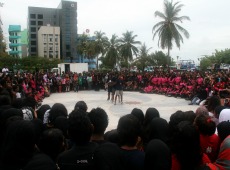Private broadcaster Raajje TV on Friday aired previously unseen footage from February 7, 2012, before the controversial resignation of former President Mohamed Nasheed.
Nasheed claimed that he resigned “under duress” after elements of the police and army joined opposition protesters and attacked the Maldives National Defence Force (MNDF) headquarters following a police mutiny in Republic Square.
The new footage shows government-aligned Progressive Party of Maldives (PPM) MP Abdulla Yameen and Jumhooree Party (JP) MP Gasim Ibrahim – both presidential hopefuls – address the protesting police, army officers and opposition supporters.
“The Indian government is with the Maldivian people,” Yameen announced to the assembled police and anti-government demonstrators. He was however cut short by police appealing for cooperation from the crowd.
After MNDF officers were pegged back and forced inside military headquarters following a confrontation with the mutinying police, the Republic Square – or the “green zone” where gatherings are prohibited – was overrun by opposition supporters and police officers.
The PPM parliamentary group leader reportedly arrived at the Republic Square after a meeting at the Indian High Commission.
Business tycoon and JP presidential candidate Gasim meanwhile praised mutinying police and army officers for their “sacrifice” and “jihad for the nation.”
In March 2012, Raajje TV aired video footage of political party leaders inside police headquarters before the resignation of President Nasheed. Upon receiving news of President Nasheed’s decision to resign, Gasim is heard to say that it was “fortunate that this ended without going to military rule.”
Gasim is a member of the Judicial Services Commission (JSC), which has appointed the three-member panel of judges overhearing Nasheed’s trial in the Hulhumale Magistrate Court.
Meanwhile, in the more recent footage televised by Raajje TV, a police officer announces that “ [state broadcaster] MNBC has been brought under control” and that the security forces were in the process of “arresting those we have to take into custody.”
Defence Minister Colonel (Retired) Mohamed Nazim and Commissioner of Police Abdulla Riyaz are also seen active in the area outside military headquarters, with one of the clips showing the latter carrying President Nasheed’s resignation letter.
Both ex-servicemen under former President Maumoon Abdul Gayoom were civilians at the time of the transfer of power.
In other videos that emerged at the time, Nazim is seen announcing to the mutinying police and army officers that President Nasheed had been told to resign “unconditionally”.
Nazim also announced that he was “in charge of the army” and would soon appoint senior officers.
One of the previously unseen videos aired by Raajje TV further showed President Nasheed exiting the military headquarters in a car surrounded by MNDF officers and being driven the short distance to the President’s Office.
Following Nazim’s appeal to those gathered to refrain from violence, former Deputy Commissioner of Police Mohamed Rishwan is also seen addressing the crowd atop a military vehicle and appealing for cooperation and nonviolence.
Rishwan had reportedly denied any involvement in the events of February 7, 2012.
Meanwhile, in an interview with government-aligned radio station DhiFM on February 8 this year, Defence Minister Nazim claimed that President Nasheed would have been mobbed and killed if he was not escorted to the President’s Office under military protection.
“I would say in truth, given the level of hatred from the public, President Nasheed would not be in this world today if we had not taken him out and to the President’s Office under our protection. [Former President] Mohamed Ameen comes to mind. The people would have mobbed [Nasheed] just like that,” Nazim was quoted as saying in local media.
He added that video clips from the day would show “the extreme level of hatred from the public”.
Similar remarks were made by PPM Deputy Leader Umar Naseer days after the transfer of power. Naseer claimed at a PPM rally that Nasheed’s only options were to either “resign after bloodshed or resign peacefully”.
On August 30, 2012, the Commonwealth-backed Commission of National Inquiry (CNI) formed by President Dr Mohamed Waheed however concluded that there was “no coup, no mutiny and no duress” in President Nasheed’s resignation.
February 8
Raajje TV has also aired a video clip from the day after the transfer of presidential power following a brutal police crackdown on a walk across Male’ by supporters of the formerly ruling Maldivian Democratic Party (MDP).
In the wake of the crackdown near the Maldives Monetary Authority (MMA) building near Republic Square, President Nasheed along with MPs Mariya Ahmed Didi and ‘Reeko’ Moosa Manik took refuge in a shop and were dragged out by riot police.
The new footage shows President Nasheed surrounded and manhandled by the Specialist Operations (SO) officers before he manages to wriggle free and run. According to media reports on February 8, Nasheed rejoined supporters at the area and was taken to safety.
MP Yameen addressing crowd
MP Gasim addressing crowd
“MNBC has been taken under control”
President Nasheed exits MNDF headquarters
President Nasheed walks to Muleeage after resignation
Riyaz carrying resignation letter
Mutinying police and army officers calling for president’s resignation
Nasheed escapes SO officers on February 8, 2012
Nasheed rejoins supporters
Nazim demands “unconditional resignation” of President Nasheed
